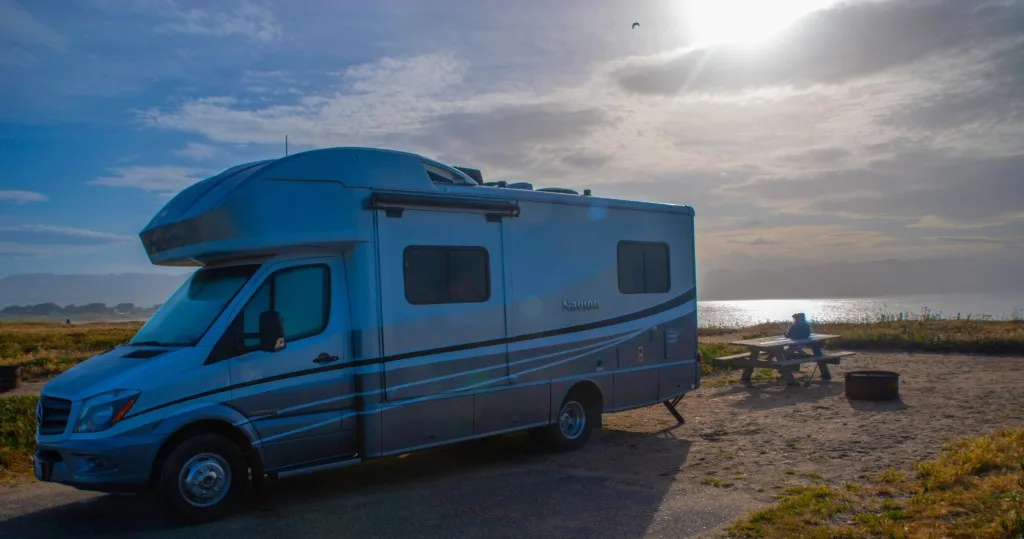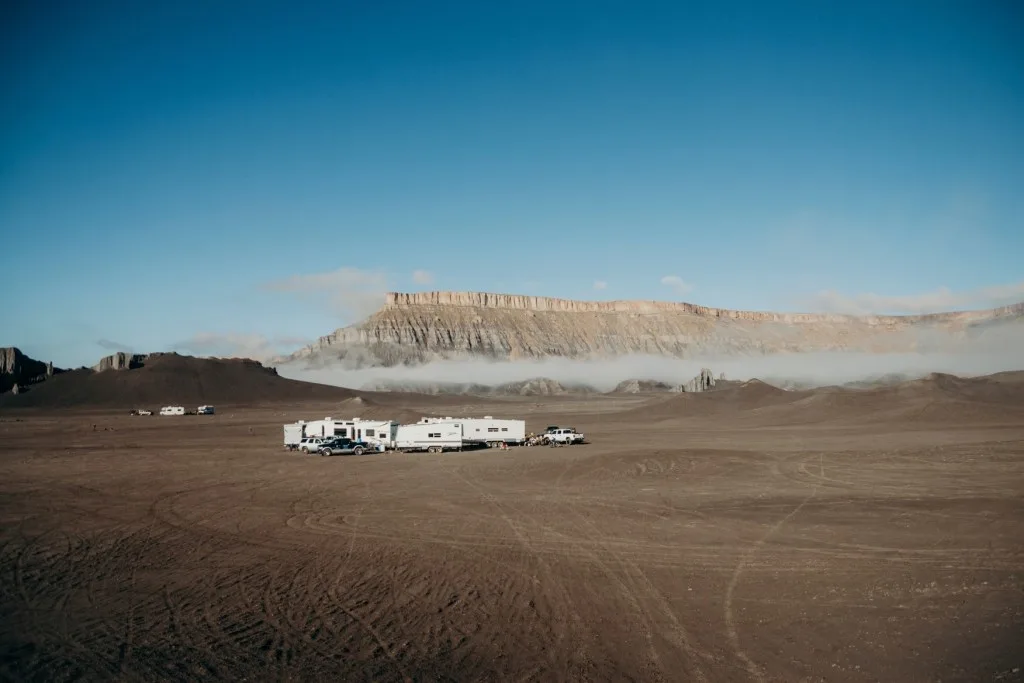As prices for everything from food to fuel rise, finding the cheapest way to vacation is becoming more challenging. That’s why many people are still opting to explore the country in RVs.
Stretching every dollar means you can enjoy more time on the road visiting fun locations. Plus, avoiding busy airports and expensive flights allows you to relax.
But is RVing still the cheapest way to vacation? We’ll help show you some costs associated with RV travel and how it can save you money in the long run.
Let’s hit the road!
Is RVing the Cheapest Way to Vacation?
Summer vacation is just around the corner. Planning to take the family on a road trip or vacation often comes down to the bottom line. Traveling as a couple is one thing, but if you’ve got a couple of kids, the cost of a weeklong excursion rises quickly.
The most common ways to vacation are road trips in a car, travel by air, and RVing. Traveling in a car, you benefit from having your vehicle with you. It might seem like this would be the cheapest way to travel.
However, the gas price is variable, and you can only carry so much food in a car. Not to mention, hotel prices are high. If you take the family to Denver for a week, hotels alone will set you back $900 or more. That’s before adding food, gas, or amusement costs.
Airfare for a family of four from Atlanta to Denver automatically takes flying off the cheapest way to vacation list. A cost of $1,600 just to get to the destination and back? No, thank you.
So let’s look at RVing. If you own your rig, the cost can differ from renting one for the trip. Owners will, of course, have to cover the expense of maintaining the vehicle, but those costs are not per trip.
Each time you hit the road, you’ll pay gas, campground fees, and food. The difference is that in your RV, you have a kitchen and sleeping accommodations with you at all times.
Just the surface numbers suggest that RVing is still the cheapest vacation mode. A weeklong vacation will only set you back $450 on average, even with gas and campground fees.
Let’s dig a little deeper and comparison-shop top travel options.

RVing Versus Hotel and Airfare Vacations
For the sake of argument, let’s say you don’t own an RV. You plan to take your brood out to the Grand Canyon, and you can’t decide if you want to fly or rent an RV.
Flying out of a major hub will average between $400 and $600 per person roundtrip. You can do the math, but $1,600 to $2,400 for travel costs before you rent a car are standard. Once there, you also have to rent a car for $100 or more a day.
Hotels average $200 a night. That adds up to $3,100 on the low end for a five-day trip before adding food and other amusements. For an active family, they may add another $1,500. And after all that, you’re still getting a point-to-point experience.
RVing, especially if you own your vehicle, is almost 75% cheaper for the same trip. Yep, you read that right. Aside from the cost, the benefits of RVing for that five-day trip are tremendous.
You can sleep in the same place every night and cook your meals. Or stop when you want and see more of this great country along the way. Skip the lines at the airport and relax as you drive out on your adventure.
Is Renting an RV Cheaper Than Flying to Vacation?
Renting an RV is a little bit different than owning one. Average rental costs for a Class C RV will run you $150 to $200 a day. If you rent a Class C, you can expect all of the luxuries of higher-end RVs but at a lower cost.
A five-day trip in a rental will run about $1,400, including gas and campground fees. As mentioned above, flying to your vacation spot will cost more than renting an RV, even before hotels.
With several different classes of RVs available, your costs could be higher or lower depending on your preferences. Where you camp in an RV can put you closer to where you want to be since attractions often have RV parks nearby.
Choosing the right RV to rent can be a big job. But we’ve gathered some numbers here for your benefit. Average prices range from $100 to $200 a night for Class B RVs to $175 up to $275 for a Class A.
Other options like a travel trailer or fifth wheel will run a more modest $50 to $150 a night. But you’ll need to make sure you have a vehicle and hitch suitable for hauling these campers.
Where you rent from can make a difference too. If you rent from an RV business, you’ll pay significantly more than renting from a private owner. Websites like Outdoorsy offer peer-to-peer rentals that are considerably cheaper than traditional sites.
Some hidden costs to consider are set-up fees, mileage, cleaning fees, and rental insurance. Some owners may include a refundable deposit to cover any damages not covered by insurance. These fees can add up to $1,000, but we feel the RV life is the way to go.

Ways to Vacation Cheaply in an RV
National and State Parks
One of the perks of RV camping is proximity to natural beauty. Booking a site through the National Parks Service or the state parks service is a great way to save. During peak season, prices range from $20 to $70 per night at most campgrounds.
Senior and Lifetime America the Beautiful Pass holders receive 50% off the nightly rate. And all annual and lifetime pass holders receive free entry into national parks.
Pro Tip: We took a closer look at What Is A National Park Pass for RVers to help you prepare for your adventures.
Army Corps of Engineer Campgrounds
The Army Corps of Engineers owns 400 sites in 43 states. Many have camping available for around $30 to $75 a night. You’ll often find ACOE campgrounds around lakes and rivers.
Many of these spots have basic hookups, but some are more well-appointed. Benefits abound with easy access to waterways, trails, beaches, and mountains.
Boondocking
Free is cheaper than anything we’ve discussed, and that’s exactly how much you’ll pay for boondocking sites. This mode of camping in an RV is off the grid without access to power, water, or sewage hookups.
Thousands of sites around the country exist for camping on public lands. This includes areas managed by the Bureau of Land Management and within national forest boundaries.
Most public sites have a two-week limit, so make sure you do your research before heading out.
Camping Clubs
Serious RVers could take advantage of a camping club membership. Clubs like Good Sam and Passport America provide campers with discounts at campsites around the country. You can also get tips on where the best spots are from other users.
For around $30, you can get a one-year membership. But if the plan costs more than you’ll save in a year, you may want to consider other options.
Pro Tip: Good Sam and Passport America aren’t the only camping clubs worth joining! Check out these 8 RV Memberships You Need Today.
Is Vacationing in an RV Worth It?
Out of all the travel options available, RVing is our clear winner for a cheap vacation. Even the added cost of renting an RV still leaves us itching to get behind the wheel.
From having creature comforts with you to the convenience of cooking, you’ll feel right at home in an RV. The perks of an RV vacation will please the whole crew.
And you can’t beat the unique locations an RV vacation will take you and your family. You’ll see places you’d never find on a plane, that’s for sure.
RV Summer Vacations Are Some of the Cheapest
Summer is just around the corner. We highly suggest you look at your options and plan an RV vacation. If you’ve never done it before, give it a try. We think you’ll like it.
Do you have other suggestions for RV vacations on a budget? Let us know in the comments!
Discover the Best Free Camping Across the USA
To be honest with you, we hate paying for camping. There are so many free campsites in America (with complete privacy).
You should give it a try!
As a matter of fact, these free campsites are yours. Every time you pay federal taxes, you’re contributing to these lands.
Become a FREE CAMPING INSIDER and join the 100,000 campers who love to score the best site!
We’ll send you the 50 Best Free Campsites in the USA (one per state). Access the list by submitting your email below: